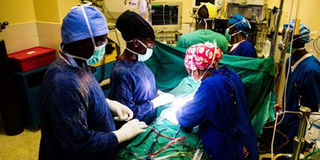How hospital claims are ‘draining’ insurance firms

What you need to know:
Motor, aviation, marine and accident jointly shared the remaining 30 per cent of the sub-sector’s underwriting losses in 2018.
Dar es Salaam. Insurance companies are paying more to hospitals than any other covered area, largely due to inflated claims lodged by some medical facilities.
This tendency by some (not all) health facilities is the reason why insurance firms’ underwriting losses remain high.
An underwriting loss refers to a loss made by an insurance company in a particular period, or in relation to a particular activity because it had to pay more in claims than expected.
In 2018, the insurance sub-sector registered Sh25.7 billion in underwriting losses, according to a report published by the Tanzania Insurance Regulatory Authority (Tira). Of the sum, about Sh18 billion, equivalent to 70 per cent, was from the health class of business.
Motor, aviation, marine and accident jointly shared the remaining 30 per cent of the sub-sector’s underwriting losses in 2018.
In 2017, underwriting losses stood at Sh26.9 billion, out of which the health sector business accounted for 56.1 per cent, which was equivalent to Sh15.1 billion.
Insurers say hospitals, especially private facilities, charge them more by quoting high drug prices.
There are also cases whereby some hospitals allow patients to use medical insurance cards of their relatives.
“As a result, cards appear to have been used several times in a year, and this translates into additional costs for insurance companies,” said Association of Tanzania Insurers (ATI) council chairperson Violet Mordichai.
But the chief executive officer of the Association of Private Health Facilities in Tanzania (Aphfta), Dr Samwel Ogillo, distanced the body’s members from the allegations.
“Insurance companies are at liberty to scrutinise bills. The only way to prove such allegations is for them to prove that culprits have been arrested in connection with the allegations,” he said,
But insurers say with the government subsidizing medicine prices in public hospitals, such challenges are largely confined to some private health facilities.
The issue of multiple use of insurance cards is common, mostly among children because it is somewhat difficult to differentiate their faces.
According to Ms Mordichai, who doubles as AAR Insurance managing director, medical costs tend to rise by between 10 and 12 per cent per year.
“This is a huge challenge because as providers we cannot increase premiums every year because adjustments can only be done every five years,” she said.
The lack of a body to regulate the costs of drugs means that every hospital has the freedom to come up with its own prices.
The Sanlam Life chief executive officer, who doubles as ATI chairman, Mr Khamis Suleiman, voiced similar sentiments.
“We are looking at how we can address issues in the medical sector because it has come to our attention that insurance costs are not right because they are put low to compete for premiums, while hospitals record high costs, some of which are not real,” he stressed.
Tira says it has received complaints that some medical facilities are engaging in dishonest deals that end up affecting insurers’ finances negatively.
“We held meetings with the insurance companies, health facilities together with the government and we all agreed that at some point, costs were being inflated. We came up with a way of curbing the situation,” Tira public relations officer Oyuke Phostine said.
In the proposed solution, the players agreed that a body to regulate the issuance of health insurance products be established and that hospital using health insurance cover facilities should be certified and given a permit.
Health deputy minister Faustine Ndugulile said the ministry has received complaints that some medical facilities were defrauding insurance companies.
“We are aware of the problem that exists in some hospitals. We are putting our eyes open, and those found committing the offence will be banned from making use of insurance services immediately,” he said.
Dr Ndugulile called on the public to ensure the information recorded on their medical records is correct before signing.
“Health facilities record their own information that is in their own interest and give the patient to sign, I urge everyone to be careful of what they sign,” he stressed.



